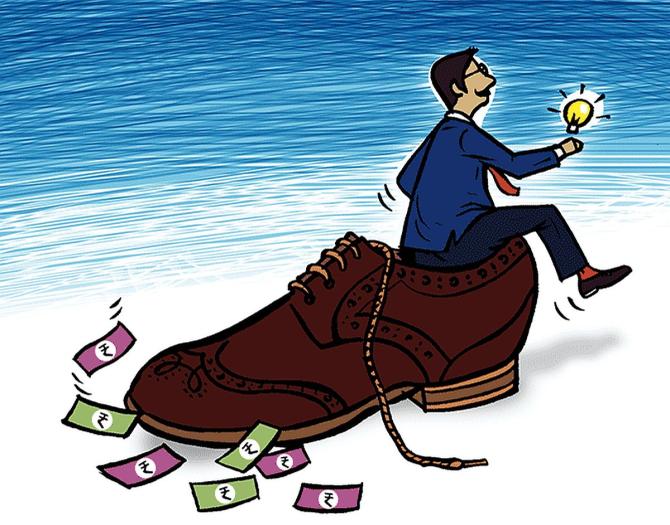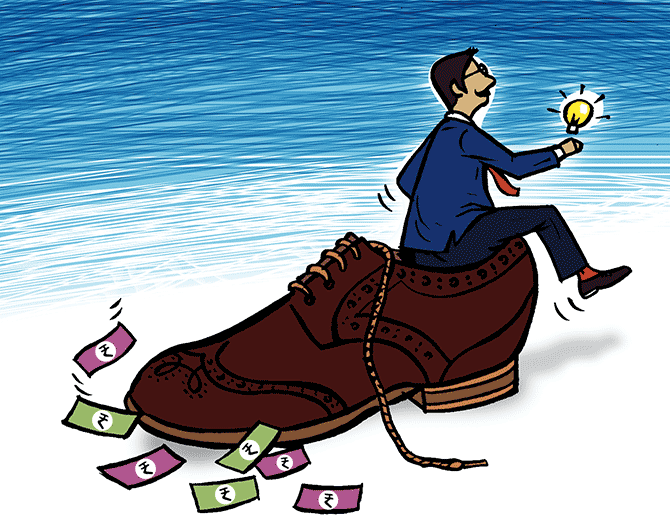'Yesterday, I was at a seed meeting where we gave outright grants up to Rs 20 lakhs or loans up to Rs 50 lakhs for new start-ups under 2 years.'

The Government of India's Startup India Web site says India has the third largest start-up ecosystem in the world, and it is expected to witness a year-on-year growth of 12%-15%.
But news reports suggest otherwise; that funds have dried up, many start-ups have wound up and thousands of jobs are lost.
"Today, even an ordinary student can think of becoming an entrepreneur. The funding system has improved substantially from what it was in the past," Angel Investor and start-up advisor Chandu Nair, tells Rediff.com's Shobha Warrier in the first of a multi-part interview.
The prime minister the other day said India had the third largest start-up ecosystem in the world. Then, there are reports that say India's start-up ecosystem has gone from boom to bust. Where lies the truth?
Yes, on one side there is growth, and we see a lot of visible interest in Indian start-ups.
That is, not only do entrepreneurs want to start, but you see a lot of activities with respect to incubators, accelerators, funding, etc.
There has been an improvement on all sides but 87% of the investments are concentrated in cities like Mumbai, Bangalore and NCR (the National Capital Region) while the rest of the 13% is spread across the country. It means there is a geographical concentration for funding.
If you look at the funding for June 2022, 7-8 companies have taken away 51% of the funding.
But, on the other side, there are steps towards democratisation of formal entrepreneurship compared to earlier days when only people from business families would typically become entrepreneurs.
But today, even an ordinary student or a faculty member can think of becoming an entrepreneur.
The funding system has improved substantially from what it was in the past.
For example, yesterday I was at a seed fund committee meeting where we gave outright grants up to Rs 20 lakhs or loans up to Rs 50 lakhs for new start-ups under 2 years.
Other than the grants from the central government, there are subsidies offered by the state governments, like the Innovation Voucher programme given by the Tamil Nadu government.
Both the Centre and the states have a lot of programmes to encourage entrepreneurship.
Other than that, many colleges also have entrepreneurship cells and incubators.
Yes, the start-up ecosystem has definitely improved.
And what we see right now is a correction.

Do you feel there is a need for course correction?
In certain cases, it was needed because the valuation went to absurd heights.
Certain entrepreneurs became over-excited. In many cases, the fundamentals were ignored.
Who is responsible for this situation?
One is the free flow of money from overseas.
About 90% of the funding to India came from overseas. Because of the Russia-Ukraine war, economic tightening post-Covid, and rising interest rates in the US and other places, the free flow of money has reduced.
Now, certain start-ups which were reliant on constant replenishment of funding, are worried about how to run their businesses. That's what the situation is today.
Funding has not completely stopped, but investors are more watchful about funding.
They are asking for profitability, and cash flows. That's a big change from what it was say, two years ago.
There were reports that hundreds of start-ups raised a record $35 billion in 2021 alone and now the bubble has burst. Has the bubble really burst?
I wouldn't say so. This did not happen in 2021 alone.
It has been there for the last 4-5 years. It's just that it peaked in 2021.
It's like this. Funding has not stopped completely, but investors are a lot more careful now, and funders are more watchful.
If you look at the US, interest rates were nearly zero, just about 1%. Now, it has gone up.
Inflation in the US is 8%. It means money is going back to the US.
Earlier there was a free flow of money to India because it was seen as more rewarding.
What made the Indian start-ups attractive to them?
One part of it is, that there are a lot of people with expertise and experience coming into entrepreneurship. And India is still seen as an unexplored market and a lot of things can happen here.
For example, the situation in the US is much more competitive.
There's a lot of untapped potential here.
Entrepreneurship in the formal sense is exploding.
The rising valuations meant handsome returns for investors too.
The Bain and Company report says there is a slowdown in funding in 2022. Is it true?
It is true. There is a slowdown in funding. There is no question about that.
We see that people are very careful everywhere.
Is that the reason why thousands of people are being fired from the heavily funded start-ups?
Yes. What happened was, that because of the easy availability of money, entrepreneurs were not careful about money expenditure, hiring, etc.
They were over-hiring and over-spending.
At one point, one start-up was spending Rs 722 to get one rupee of revenue. Who in their right mind does that?
If you look at some of the new-age start-ups, like in the consumer-oriented businesses, they were overspending.
And some finrech companies were going on the grey side of the law like in buy-no, pay later.
It was as if you were being given money on the fintech app.
Often, without clear written consent, it was as if you signed for a loan in your name, without your properly being educated or informed about it! It affects your credit worthiness.
A lot of things like this were happening.
Is it common all over the world when such an unusual boom happens?
It is not just specific to India; it happens everywhere.
For example, a company like Zoom is around 25-% of what its peak was during the pandemic. In fact, the situation is worse there in the US.
Feature Presentation: Rajesh Alva/Rediff.com









